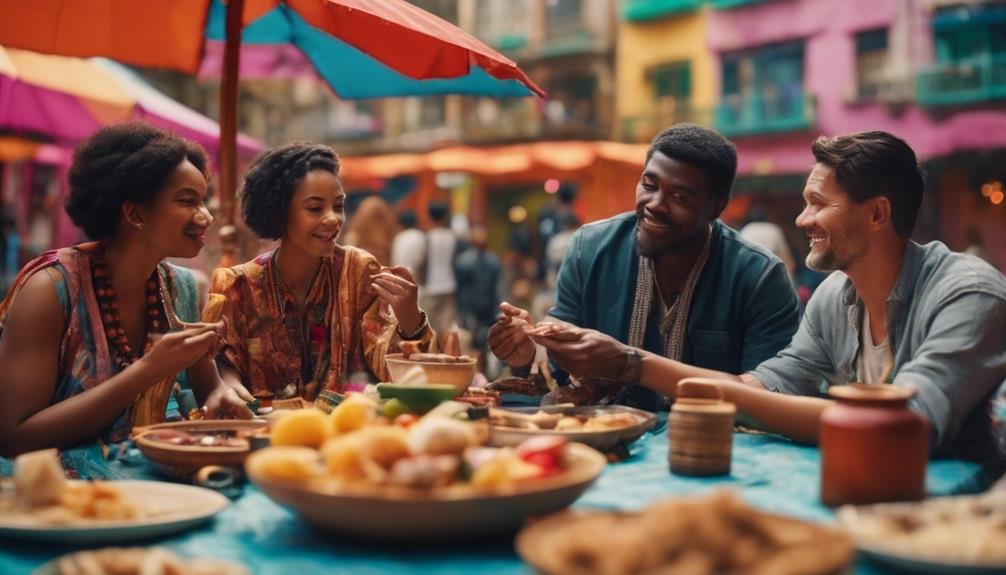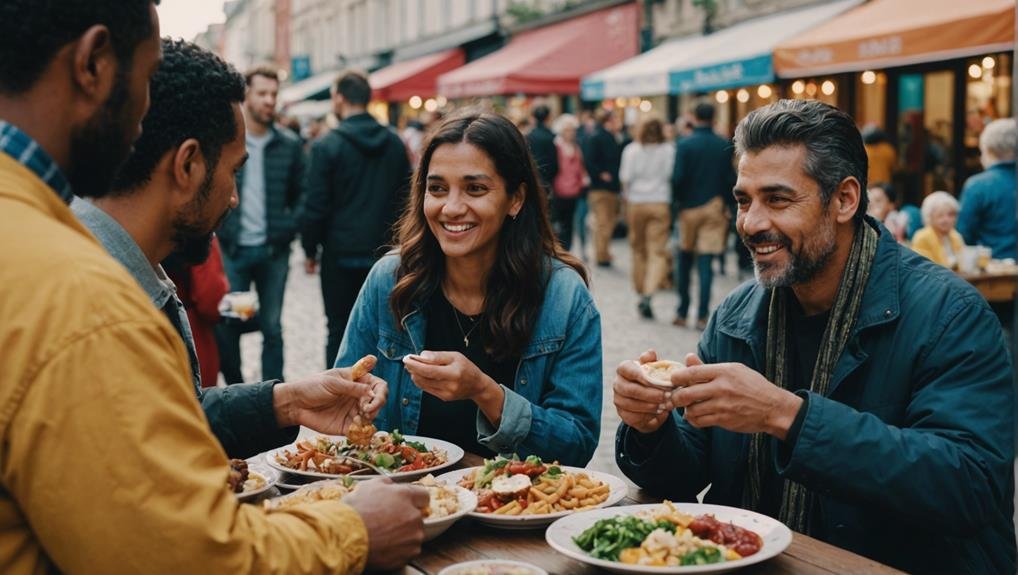Adapting to a new culture as an expat can be challenging yet immensely rewarding. You'll need to navigate local traditions, social norms, and perhaps even a new language. But how do you make this shift as smooth as possible? Understanding the local culture is essential, and learning the language can open many doors. Engaging in community activities and building local friendships can make you feel more at home. Staying open-minded and embracing diversity will enrich your experience. Curious about how to implement these tips effectively? Let's explore each of these strategies in more detail.
Key Takeaways
- Research local traditions, social norms, and etiquette to understand and respect the new culture.
- Learn the local language to enhance communication and social integration.
- Attend local festivals, community activities, and cultural events to immerse yourself in the culture.
- Build friendships by joining meetups, language exchange groups, and networking events.
- Stay open-minded and embrace cultural differences to enrich your experience abroad.
Understand Local Culture

Understanding the local culture is essential for expats to smoothly integrate into their new environment. Culture shock can vary for everyone, but taking steps to aid cultural adaptation will make adjusting to living abroad easier. Start by researching local traditions, etiquette, and social norms. This helps you avoid misunderstandings and shows respect for the local culture. Understanding dominant religions and prevalent gender roles is also vital; these aspects often influence daily life and societal expectations.
Sampling traditional cuisine is an enjoyable way to learn new aspects of the culture. Attend community events and festivals to immerse yourself fully and gain deeper insights. These gatherings provide first-hand experiences of local traditions and customs.
Joining language exchange groups and local meetups can also accelerate your cultural adjustment. These platforms allow you to make friends and gather invaluable insights into the local way of life. Engaging in conversations with locals helps you understand their perspectives and fosters a sense of belonging.
Learn the Language
To truly integrate into your new environment, learning the local language is a vital step toward deeper cultural immersion and effective communication. When moving abroad, speaking the host country's language can greatly enhance your experience, making daily interactions smoother and fostering a sense of belonging.
Here are four key benefits of learning the language:
- Enhanced Job Prospects: Mastering the local language can open up job opportunities that might otherwise be inaccessible. Employers value candidates who can communicate effectively with clients and colleagues.
- Improved Social Integration: Language proficiency helps you build relationships with locals, making it easier to make friends and participate in community activities. This social integration is essential for feeling at home in your new surroundings.
- Boosted Cognitive Abilities: Learning a new language improves cognitive abilities, including memory retention and problem-solving skills. Studies show that bilingual individuals often exhibit superior mental agility.
- Increased Cultural Competence: Understanding and speaking the local language enhances your cultural competence. It enables you to gain deeper insights into cultural nuances, fostering empathy and a better understanding of diverse perspectives.
Investing time in learning the language of your new home can greatly enrich your experience abroad, making it more rewarding and fulfilling.
Engage in Community Activities

Engaging in community activities is a fantastic way to immerse yourself in the local culture and build meaningful connections. Start by participating in local festivals and cultural celebrations. These events provide an immersive experience, allowing you to see traditional dances, music, and customs up close. You'll also have the opportunity to meet and connect with locals who share their heritage.
Another excellent way to engage is by exploring traditional markets. These bustling hubs offer a glimpse into daily life and give you the chance to interact with vendors and shoppers. You can ask questions, learn about local produce, and perhaps even pick up a few words in the local language.
Attending sporting events is another great way to connect with people and understand their popular pastimes. Whether it's a local soccer match or a regional cricket game, sporting events offer a communal atmosphere and a chance to engage with enthusiastic fans.
Volunteering is also a powerful way to make a positive impact and build relationships. By contributing your time and skills, you're not only helping the community but also forging deeper connections and understanding the local way of life.
Through these community activities, you'll create lasting memories and a genuine sense of belonging.
Build Friendships
Building friendships is a natural extension of participating in community activities and can greatly enhance your experience abroad. Making new friends helps you adapt to the new culture and gain valuable insights.
Here are some practical steps:
- Join Local Meetups and Language Exchange Groups: These are excellent places to meet people who share similar interests. Language exchange groups can be particularly useful, as they offer a dual benefit of practicing the local language while making friends.
- Engage in Community Events: Attend local fairs, festivals, and other community events. These settings provide a relaxed atmosphere where you can meet locals and immerse yourself in the culture.
- Attend Networking Events: Professional and social networking events are great for meeting like-minded individuals. They can help you expand your social circle and build valuable connections.
- Be Approachable and Step Out of Your Comfort Zone: Smile, make eye contact, and be open to conversations. Sometimes you'll need to take the first step, but it's worth it. Each new friendship can offer guidance and support in adapting to your new environment.
Stay Open-Minded

Staying open-minded is essential for embracing and understanding the new culture you're immersed in. When moving abroad, it's important to approach your new environment with curiosity and respect. This mindset helps you learn and appreciate the differences between your home culture and the new country's culture. Avoid making assumptions based on your own norms; instead, take the time to observe and understand the local customs, traditions, and practices.
Engaging in these cultural experiences will not only help you adapt more smoothly but also enrich your overall experience. By embracing diversity and being open to new experiences, you'll find that your shift becomes more enjoyable and less stressful. Here's a snapshot to help you visualize the differences and similarities:
| Aspect | Home Country | New Country |
|---|---|---|
| Social Etiquette | Familiar and Predictable | New and Unfamiliar |
| Food and Dining | Comforting and Known | Exciting and Varied |
| Language | Native and Fluent | Foreign and Challenging |
| Traditions and Festivals | Familiar Celebrations | Fresh and Unique Events |
Frequently Asked Questions
How to Adapt to Foreign Culture?
To adapt to a foreign culture, start by researching traditions, etiquette, and social norms. Learning the local language is essential, so pick up some basic vocabulary and conversational skills.
Immerse yourself in community events, festivals, and activities to feel more connected. Make new friends by joining language exchange groups and attending local meetups.
Embrace differences, keep an open mind, and actively engage in local customs.
What Is the Culture Shock of the Expat?
Culture shock for an expat is the disorientation you feel when faced with new customs, behaviors, and social norms. You might experience frustration, homesickness, anxiety, and confusion as you navigate this unfamiliar environment.
Initially, you'll feel excited and fascinated, but then disillusionment can set in. With time, you'll adjust. Understanding these stages and developing strategies to cope can make adapting to the new culture smoother for you.
What Are the Four Ways That People Can Adapt When They Experience a Cultural Change?
Oh, so you've decided to uproot your life and immerse yourself in a new culture? Brave! Here are your four magical paths:
Assimilate and become a local clone.
Acculturate and juggle both cultures.
Integrate to craft a hybrid identity.
Separate and live in a cultural bubble.
Each choice shapes your experience. Just remember, there's no one-size-fits-all approach—it's a rollercoaster, but hey, at least it's your ride!
How Do You Adapt to Living in Another Country?
To adapt to living in another country, you need to embrace the culture. Start by researching local traditions, etiquette, and cuisine.
Learn the language with basic vocabulary and phrases. Participate in community events and festivals to connect with locals. Make friends through language exchange groups and meetups.
Stay open-minded and engage in local customs. By immersing yourself in the culture, you'll adapt more smoothly.
Conclusion
Embracing a new culture isn't just a journey; it's a thrilling time machine ride that enriches your life in ways you can't predict.
By understanding local customs, learning the language, participating in community activities, and building friendships, you'll find yourself growing in ways you never imagined.
Remember, staying open-minded and avoiding assumptions will make your experience abroad truly rewarding.
So, step out of your comfort zone and enjoy the adventure!


